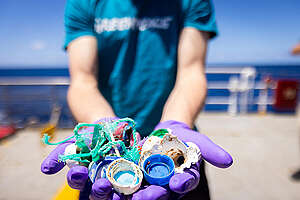The crew aboard Greenpeace ship, the Esperanza (the Espy), are in their third week touring the Pacific to help send a message to world leaders about climate change impacts in the region.
In this latest update, Emily reports on their work with locals in Pukapuka and Nassau.
Ki Orana from a sleepy Sunday morning on the Esperanza. We have just finished our week in the Pukapuka and are now making our way to Samoa for the next phase of the tour.
The visit to Pukapuka and the neighboring island of Nassau has been a pretty amazing experience for everyone on board. These are some of the most remote islands in the Pacific. Pukapuka is an atoll consisting of three small islands around a large lagoon – with a total population of around 400. Nassau is just one tiny island with a population of only 80 people. People have been living here for over 1000 years and developed a strong and vibrant culture and have managed to live a largely self sufficient lifestyle. Although very beautiful (the postcard type tropical islands) they feel very isolated – with no regular flights here and a ship that only comes by every few months with supplies.
The local community have been amazingly welcoming to us. We arrived on Monday to a community welcome and then, on the following day (Tuesday), we were invited to the school for yet another welcome. It was a beautiful experience with all the little children singing and the older ones (high school age) performing traditional dancing, then making all of us get up and dance with them. Our Hula dancing skills are enthusiastic but still a long way to go before making it look as easy as the locals do. 🙂
On Tuesday evening, we travelled across to the neighboring island of Nassau for a one-day visit. ALong with us was the local dentist, the telecom technician and the local mayor. Another amazing welcome greeted us — a feast of crayfish and coconut crabs. The Cook Islands government’s climate team then ran a community meeting talking about climate impacts and what the locals are noticing.
On our return trip we had a couple of the local people come with us who had to visit the doctor on Pukapuka (they will then wait for a few weeks until a boat comes to take them home). That evening, in the lounge, all the locals sang traditional songs in beautiful harmonies and Charlie (from the Red Cross in the Cook Islands) gave us a hula dancing lesson — pretty challenging at the best of times and the rolling of the ship made it very entertaining for all watching.
Helping the Cook Islands Government on climate change
The main purpose of us coming here to Pukapuka and Nassau has been to assist the Cooks government and Red Cross to undertake a Community Climate Change Vulnerability Assessment. To start the assessment process on the islands, the Cook Island Climate team began with community workshops for each of the four villages. It has been fascinating and also heartbreaking listening to the locals. People don’t have a lot of knowledge about the science and politics of climate change but they are noticing that things are changing – the droughts are more severe, the seasons have all changed, the storms and cyclones are worse, mosquitos are increasing, fish species are disappearing, and so on.
Many people are worried about their future and the future of their community. In one of the workshops, a very old man stood up and said that he had been reading about Tuvalu and how they may have to leave their islands. “Where will the people from Tuvalu go?,” he asked. “And if it is happening to them, then it will likely be happening to us. What will happen to our community? Where will our people go? We don’t want to leave our homes.”
We all feel very privileged to have been able to visit these remote and unique islands, and spend some time with the people here. They have such a strong sense of community and culture, and yet it is here that the injustice of climate change is starkly apparent. These people live such low-impact and largely sustainable lifestyles but are going to be the ones that suffer first (and likely the most) from the actions of the developed world. They have welcomed us into their community, their homes and their culture. They have told us their stories, fed us, sang with us and danced with us. I think this has inspired us all and made the work that we are all doing towards a strong deal at Copenhagen even more relevant, hoping that it will deliver enough for these people to be able to stay here living the lifestyle they value so much.
So, now on to Samoa where a team there have been organising a range of exciting events. We’ll arrive to a welcome from the Prime Minister and others. More on that to come.
Cheers,
Emily and the rest of the team aboard the Espy

